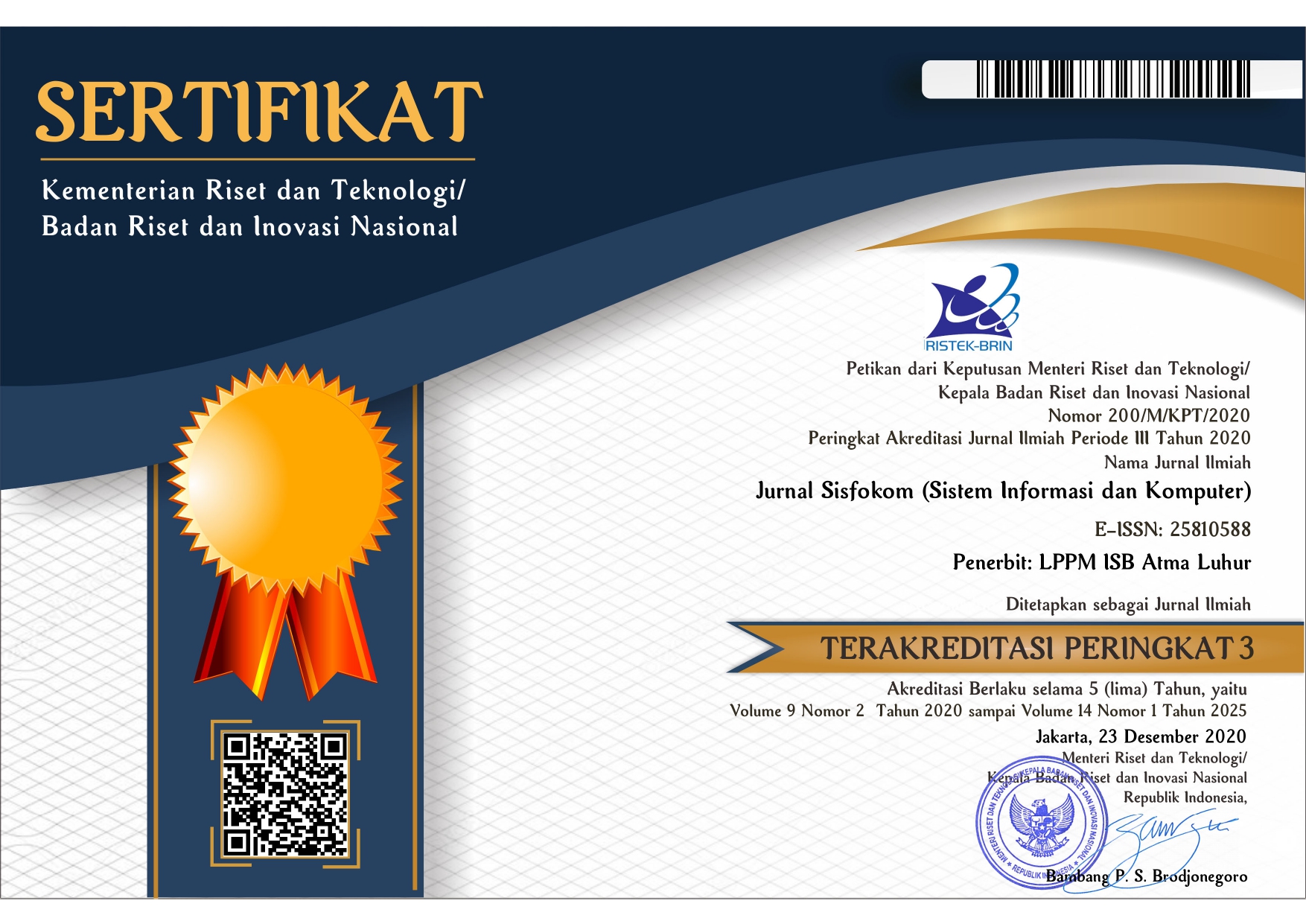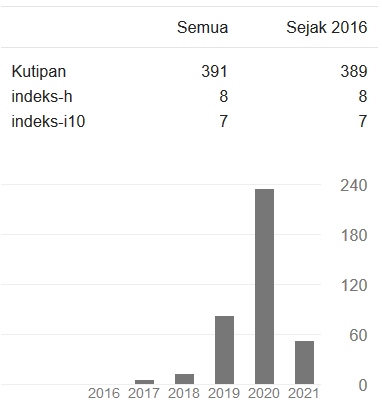Implementation of Grounded Theory to Analyze the Effect of Social Media Functionality on MSME Market Segmentation in Indonesia
DOI:
https://doi.org/10.32736/sisfokom.v12i2.1683Keywords:
Business Process Management, IT Implementation, SME, Social Media, HydroponicAbstract
Empowering SMEs in the midst of globalization and high competition has forced MSMEs to face global challenges, such as increasing innovation, developing human resources and technology, and expanding the marketing area. Social networks provide a medium for processing new innovations for SMEs such as relationships with customers, work partners and also suppliers. Business process management can assist business actors in carrying out their business activities in the face of today's challenges and global competition. This study reveals that every business process can be supported by the implementation of IT by a company. This study uses a grounded theory approach. Grounded theory studies tend to follow a structured approach. This research uses case studies of hydroponic SMEs in Indonesia, which produce the types of social media & social media functions that are often used by Indonesians. The main strength of this research is the functions of social media needed by SME actors. From the results of the study it was found that SMEs need social media functionality in 4 functions, namely: the interaction function, the marketing function, the reputation function, and the information function. SMEs in Indonesia need applications that contain these 4 functions to be able to market, sell, and interact with other people.References
“Ministry of Industry Making Indonesia 4.0 Making Indonesia 4.0 Making Indonesia 4.0.”
P. Xie, Q. Chen, P. Qu, J. Fan, and Z. Tang, “Research on financial platform of railway freight supply chain based on blockchain,” Smart and Resilient Transportation, vol. 2, no. 2, pp. 69–84, Dec. 2020, doi: 10.1108/srt-09-2020-0007.
P. Mathiesen, J. Watson, W. Bandara, P. Michael Rosemann, and A. Paul Mathiesen, “Applying Social Technology to Business Process Lifecycle Management,” 2011.
M. Zairi, “Business process management: A boundaryless approach to modern competitiveness,” Business Process Management Journal, vol. 3, no. 1, pp. 64–80, Apr. 1997, doi: 10.1108/14637159710161585.
J. Prodanova and A. Van Looy, “How Beneficial is Social Media for Business Process Management? A Systematic Literature Review,” IEEE Access, vol. 7, pp. 39583–39599, 2019, doi: 10.1109/ACCESS.2019.2903983.
M. Rosemann, “Handbook on Business Process Management 2,” Handbook on Business Process Management 2, no. March 2014, doi: 10.1007/978-3-642-01982-1.
M. Rosemann and J. vom Brocke, “The Six Core Elements of Business Process Management,” in Handbook on Business Process Management 1, Springer Berlin Heidelberg, 2010, pp. 107–122. doi: 10.1007/978-3-642-00416-2_5.
J. Prodanova and A. Van Looy, “How Beneficial Is Social Media for Business Process Management? A Systematic Literature Review,” IEEE Access, vol. PP, no. c, pp. 1–1, 2019, doi: 10.1109/ACCESS.2019.2903983.
Szeechenyi Istvaan Egyetem, IEEE Hungary Section, and Institute of Electrical and Electronics Engineers, CogInfoCom 2015 : 6th IEEE International Conference on Cognitive Infocommunications : proceedings : October 19-21, 2015, Széchenyi István University, Győr, Hungary.
J. Crumbly and L. Carter, “Social Media and Humanitarian Logistics: The Impact of Task-technology Fit on New Service Development,” in Procedia Engineering, Elsevier Ltd, 2015, pp. 412–416. doi: 10.1016/j.proeng.2015.06.099.
S. Smolnik, N. Urbach, J. L. Fjermestad, P. Cragg, and A. Mills, “IT support for business processes in SMEs,” Business Process Management Journal, vol. 17, no. 5, pp. 697–710, Sep. 2011, doi: 10.1108/14637151111166141.
J. M. Strauss, Anselm L.; Corbin, Basics of Qualitative Research : Techniques and Procedures for Developing Grounded Theory. Sage Publications, Inc., 2010.
ICGCIoT 2015 Greater Noida, Institute of Electrical and Electronics Engineers, ICGCIoT 2015.10.08-10 Greater Noida, and International Conference on Green Computing and Internet of Things 2015.10.08-10 Greater Noida, Proceedings of the 2015 International Conference on Green Computing and Internet of Things (ICGCIoT) 8-10 October 2015, Greater Noida, India : venue: GCET, Greater Noida, Delhi.
S. Ainin, F. Parveen, S. Moghavvemi, N. I. Jaafar, and N. L. M. Shuib, “Factors influencing the use of social media by SMEs and its performance outcomes,” Industrial Management & Data System, vol. 115, no. 3, pp. 570–588, 2015, doi: 10.1108/IMDS-07-2014-0205.
J. H. Kietzmann, K. Hermkens, I. P. McCarthy, and B. S. Silvestre, “Social media? Get serious! Understanding the functional building blocks of social media,” Bus Horiz, vol. 54, no. 3, pp. 241–251, May 2011, doi: 10.1016/j.bushor.2011.01.005.
Syed Zamberi Ahmad, Abdul Rahim Abu Bakar, Norita Ahmad, “Social media adoption and its impact on firm performance : the case of the UAE,” 2018, doi: 10.1108/IJEBR-08-2017-0299.
ICGCIoT 2015 Greater Noida, Institute of Electrical and Electronics Engineers, ICGCIoT 2015.10.08-10 Greater Noida, and International Conference on Green Computing and Internet of Things 2015.10.08-10 Greater Noida, Proceedings of the 2015 International Conference on Green Computing and Internet of Things (ICGCIoT) 8-10 October 2015, Greater Noida, India : venue: GCET, Greater Noida, Delhi.
S. Chung and J. Park, “Exploring consumer evaluations in social media: The role of psychological distance between company and consumer,” 2017, doi: 10.1016/j.chb.2017.07.042.
C. Daymon and I. Holloway, “Qualitative Research Methods in Public Relations and Marketing Communications, Second edition.”
R. Cui, S. Gallino, A. Moreno, and D. Zhang, “The Operational Value of Social Media Information,” 2017, doi: 10.1111/ijlh.12426.
A. A. Dini, “Affordances and effects of introducing social media within eParticipation — Findings from government ‐ initiated Indonesian project,” no. December 2017, pp. 1–14, 2018, doi: 10.1002/isd2.12035.
Downloads
Additional Files
Published
Issue
Section
License
The copyright of the article that accepted for publication shall be assigned to Jurnal Sisfokom (Sistem Informasi dan Komputer) and LPPM ISB Atma Luhur as the publisher of the journal. Copyright includes the right to reproduce and deliver the article in all form and media, including reprints, photographs, microfilms, and any other similar reproductions, as well as translations.
Jurnal Sisfokom (Sistem Informasi dan Komputer), LPPM ISB Atma Luhur, and the Editors make every effort to ensure that no wrong or misleading data, opinions or statements be published in the journal. In any way, the contents of the articles and advertisements published in Jurnal Sisfokom (Sistem Informasi dan Komputer) are the sole and exclusive responsibility of their respective authors.
Jurnal Sisfokom (Sistem Informasi dan Komputer) has full publishing rights to the published articles. Authors are allowed to distribute articles that have been published by sharing the link or DOI of the article. Authors are allowed to use their articles for legal purposes deemed necessary without the written permission of the journal with the initial publication notification from the Jurnal Sisfokom (Sistem Informasi dan Komputer).
The Copyright Transfer Form can be downloaded [Copyright Transfer Form Jurnal Sisfokom (Sistem Informasi dan Komputer).
This agreement is to be signed by at least one of the authors who have obtained the assent of the co-author(s). After submission of this agreement signed by the corresponding author, changes of authorship or in the order of the authors listed will not be accepted. The copyright form should be signed originally, and send it to the Editorial in the form of scanned document to sisfokom@atmaluhur.ac.id.









